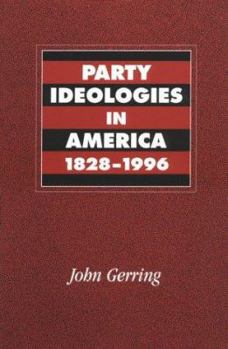Party Ideologies in America, 1828-1996
Select Format
Select Condition 
Book Overview
Is American politics ideological, or relatively consensual? Do the American parties differ from one another and, if so, how? Party Ideologies in America, 1828-1996 is a synthetic history and analysis of the ideologies of the major American parties from the early nineteenth century to the present. It is the only book currently in print that attempts such a broad treatment of the subject and that is empirically grounded.
Format:Paperback
Language:English
ISBN:0521785901
ISBN13:9780521785907
Release Date:February 2001
Publisher:Cambridge University Press
Length:352 Pages
Weight:1.08 lbs.
Dimensions:0.8" x 6.0" x 9.0"
Customer Reviews
3 ratings
Great clarification of political speech
Published by Thriftbooks.com User , 23 years ago
The author has identified long periods of time spanning several generations where the ideologies of the Whigs-Republicans and the Democrats have been generally consistent before transitioning to new philosophies. The book rests on the statements and views of party elites, though mostly presidential candidates, during presidential campaigns as being definitive of those parties' ideologies.The periods identified for the Whigs and Republicans are the National Epoch (1828-1924) and the Neo-Liberal Epoch (1928-1992). For the Democrats the periods are the Jeffersonian Epoch (1828-1892), the Populist Epoch (1896-1948), and the Universalist Epoch (1952-1992). It may be surprising to learn that Bryan and not FDR started an epoch or that Hoover was the first neo-liberalist and not Goldwater or Reagan.The author explores the nuances of the views of the parties on such matters as liberty, democracy, equality, virtue, the market, labor, etc. For example, both parties could make the claim of being pro labor. But for 19th century Republicans labor was not much different than modern-day entrepreneurship. The rise of organized labor, or unionism, was an unwelcome development. Democrats generally viewed labor as work done by the common man and did not include economic elites. The author clearly shows that some aspects of party ideologies underwent near reversal across political epochs. By far the most interesting reversal of views is the attitude of the parties concerning the state and by extension the national government. The Whigs and Republicans of the 19th century were far more state-oriented than are the Reaganites. Republicans supported state intervention in the economy in building public works, maintaining high tariffs, and in generally advancing the cause of Americanism. The 19th century Democrats on the other hand were highly suspicious of state power. The Jacksonian assault on the National Bank is the foremost example of acting on that suspicion. Yet beginning with the Populist Epoch, Democrats sought to use the state to counter the increasing power of industrial entities. The nineteenth century Republicans favored the growth of large economic entities, however the rhetoric of latter day Republicans seems to favor the rights of small businessmen and is opposed to anti-competitive formations and state regulation of the economy. Here the author could question the legitimacy of party ideologies. The claims of the pro-business party to be representing small businessmen in an era of massive corporate consolidations would seem to be of dubious validity. However, clearly the two parties have completely reversed their views of the state.The book is well organized; it definitely clarifies the political speech of the two major American political parties by providing well-drawn frameworks on which to hang that speech.
Insightful and Interesting
Published by Thriftbooks.com User , 25 years ago
An excellent discussion on party ideology in America, well researched and nicely presented. Starts off with a helpful review of where the thesis will take the reader, and then methodically makes the points and convinced me, the skeptical reader.For the record, my favorite passage is a quote of Martin Van Buren on page 43... but you will have to read the book to find out what I mean!
Simply the best book on this topic
Published by Thriftbooks.com User , 25 years ago
This book is must reading for anyone with a serious interest in American political parties and their historical development. Gerring's work is a major contribution, showing that American parties do have distinct ideologies, and that these ideologies have persisted over long stretches of American history. The book is extremely well-researched, and written in a clear and engaging fashion.





